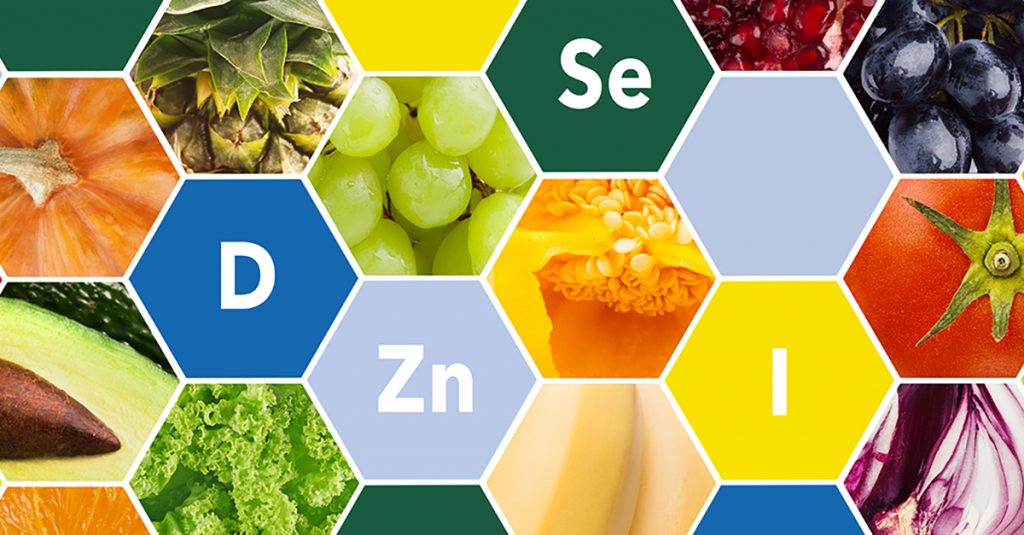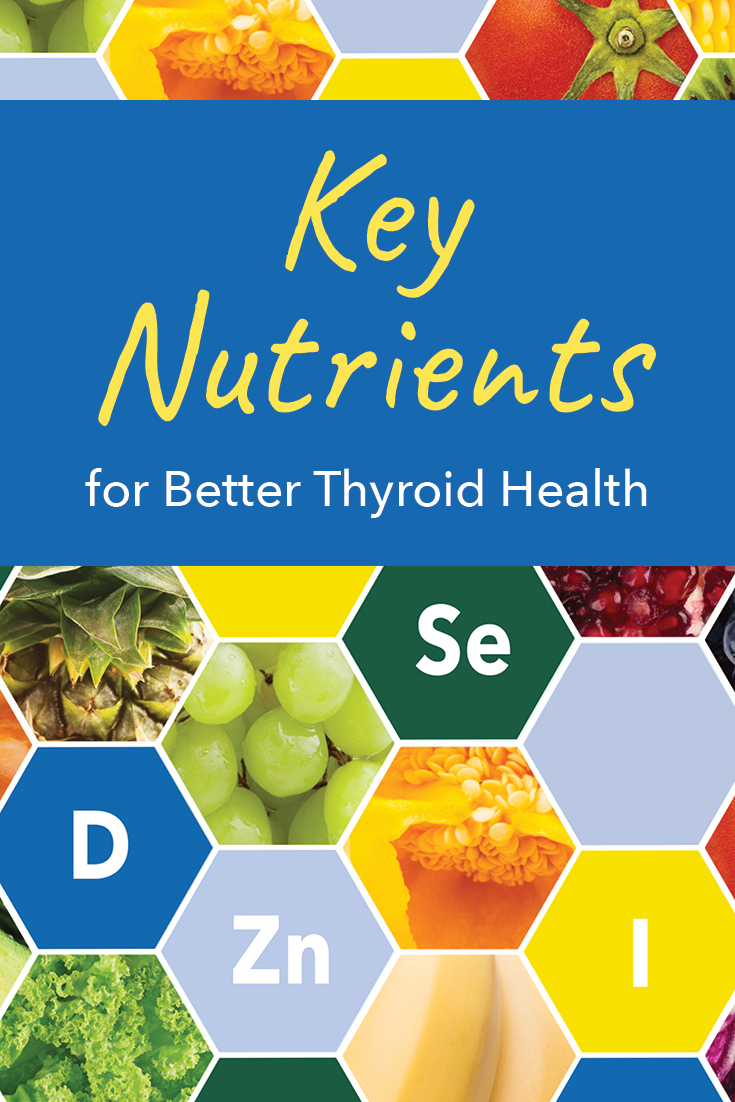Expert Advice

Acella Pharmaceuticals is partnering with Lindy Ford, RD, LDN to bring greater awareness to the importance of thyroid care and education. This post is sponsored by Acella Pharmaceuticals.
Disclaimer: The information provided is for educational purposes only and does not substitute professional medical advice. Consult a medical professional or healthcare provider before beginning any exercise, fitness, diet, or nutrition routine. Acella Pharmaceuticals does not endorse, promote or sponsor any products or brands mentioned in this article. The views expressed here are those of the author. Talk to your healthcare provider or dietician about your specific dietary needs and nutrient intake. These practitioners are best suited to advise what is right for your specific medical situation. Don’t take nutritional supplements on your own or without your healthcare provider or dietician’s approval.
Taking medication is crucial for fighting hypothyroidism, but certain nutrients also are essential in managing the condition. When combined with the right medication, these nutrients may help minimize symptoms and restore thyroid function.
It’s best to get these nutrients through food, but if supplementation is used, consult with a health care practitioner first. The nutrients listed below are not exhaustive, but they are a good place to start. Feeding your thyroid optimally with these nutrients may make a huge difference in the quality of your life.
1. Iodine
Iodine deficiency is rare in the United States, but not getting optimal amounts is quite common, especially in people who present with hypothyroidism. I am one of them. I not only have thyroid disease, but my bloodwork often shows I ’m low in iodine.
Conventional blood lab levels do not always give true iodine status. If you have hypothyroidism, it is a good idea to eat a diet rich in iodine. I made the mistake of using non-iodized sea salt and now I’ve switched over.
Iodine assists in the conversion of thyroid stimulating hormone (TSH) to triiodothyronine (T3) and thyroxine (T4). This conversion is important for the thyroid to function properly.
Iodine may have other physiological functions in the body as well. For example, it appears to play a role in immune response and might have a beneficial effect on fibrocystic breast disease and growth of abnormal cells in breast tissue. 1
Foods high in iodine include dried seaweed, wild caught cod, plain yogurt, iodized salt, wild caught shrimp, pastured eggs and tuna.
2. Selenium
For the thyroid to do its job, the less biologically active T4 needs to be converted to the biologically active T3 hormone. Selenium assists in this conversion.2
Selenium is also a powerful antioxidant. It reduces inflammation and protects normal cell function by scavenging free radicals.
It is best obtained from food sources, but I do supplement my hypothyroid patients with selenium methionine. Again, it’s best to consult with your health care practitioner for your specific situation and dosage. Good food sources include Brazil nuts, yellowfin tuna, oysters, grass-fed beef, chicken, wild caught shrimp and shiitake mushrooms. Because Brazil nuts are so high in selenium, it is wise to limit intakes to one to three a day. 3
3. Zinc
In addition to selenium, zinc plays a role in activating thyroid hormones. I am not a fan of supplementing with zinc (except in a multivitamin/mineral). It can easily lead to an imbalance with other crucial minerals.
It is best to consume zinc rich foods such as oysters, grass-fed beef, chicken, Alaskan king crab, pork chops, shiitake mushrooms, lentils and plain yogurt.
4. Vitamin D
Again, conventional lab levels of vitamin D are not optimal levels. I like my patients to have levels over 50 mg/dl. Vitamin D deficiency has been associated with numerous autoimmune diseases and specifically thyroid autoimmune conditions such as Graves’ disease and Hashimoto’s disease. 4,5
A common source of vitamin D is sun exposure. But even with sun exposure and supplementation, some patients still see suboptimal levels of vitamin D. Why is that? The reasons are numerous and include poor gut health (impaired absorption), high stress (increased cortisol), obesity, inadequate consumption of fat, aging and inflammation.
Yes, I will supplement my patients, but I will also work with them to address these underlying conditions. When they do, not only do their vitamin D levels increase, but more importantly their thyroid function greatly improves.
There are other nutrients important for thyroid function, but these are tops for me. If you are struggling with thyroid disease, remember that nutrition is one of your biggest allies. If you concentrate on eating healthy foods, and address the underlying causes of the disease, your quality of life will be enhanced.

REFERENCES: 1. Institute of Medicine, Food and Nutrition Board. Dietary Reference Intakes for Vitamin A, Vitamin K, Arsenic, Boron, Chromium, Copper, Iodine, Iron, Manganese, Molybdenum, Nickel, Silicon, Vanadium, and Zinc. Washington, DC: National Academy Press, 2001. 2. Int J Endocrinol. Selenium and Thyroid Disease: From Pathophysiology to Treatment. 2017; 2017: 1297658. Published online 2017 Jan 1. doi: 10.1155/2017/1297658. Mara Ventura, Miguel Melo and Francisco Carrilho. 3. ScienceDirect Chapter 29 - Brazil Nuts (Bertholletia excelsa): Improved Selenium Status and Other Health Benefits https://doi.org/10.1016/B978-0-12-375688-6.10029-5. Christine D.Thomson. 4. Curr Opin Pharmacol. 2010 Aug;10(4):482-96. doi: 10.1016/j.coph.2010.04.001. Epub 2010 Apr 27. Vitamin D: modulator of the immune system. Baeke F, Takiishi T, Korf H, Gysemans C, Mathieu C. 5. lin Endocrinol (Oxf). 2003 Sep;59(3):396-401. Risk factors for and prevalence of thyroid disorders in a cross-sectional study among healthy female relatives of patients with autoimmune thyroid disease. Strieder TG, Prummel MF, Tijssen JG, Endert E, Wiersinga WM.
Note that DTE products, including NP Thyroid®, have not been reviewed by the FDA for safety or efficacy.
IMPORTANT RISK INFORMATION, INCLUDING BOXED WARNING & INDICATIONS
Important Risk Information
Drugs with thyroid hormone activity, alone or together with other therapeutic agents, have been used for the treatment of obesity. In euthyroid patients, doses within the range of daily hormonal requirements are ineffective for weight reduction. Larger doses may produce serious or even life-threatening manifestations of toxicity, particularly when given in association with sympathomimetic amines such as those used for their anorectic effects.
- NP Thyroid® is contraindicated in patients with uncorrected adrenal insufficiency, untreated thyrotoxicosis, and hypersensitivity to any component of the product.
- In the elderly and in patients with cardiovascular disease, NP Thyroid® should be used with greater caution than younger patients or those without cardiovascular disease.
- Use of NP Thyroid® in patients with diabetes mellitus or adrenal cortical insufficiency may worsen the intensity of their symptoms.
- The therapy of myxedema coma requires simultaneous administration of glucocorticoids.
- Concomitant use of NP Thyroid® with oral anticoagulants alters the sensitivity of oral anticoagulants. Prothrombin time should be closely monitored in thyroid-treated patients on oral anticoagulants.
- In infants, excessive doses of NP Thyroid® may produce craniosynostosis.
- Partial loss of hair may be experienced by children in the first few months of therapy but is usually transient.
- Adverse reactions associated with NP Thyroid® therapy are primarily those of hyperthyroidism due to therapeutic overdosage.
- Many drugs and some laboratory tests may alter the therapeutic response to NP Thyroid ®. In addition, thyroid hormones and thyroid status have varied effects on the pharmacokinetics and actions of other drugs. Administer at least 4 hours before or after drugs that are known to interfere with absorption. Evaluate the need for dose adjustments when regularly administering within one hour of certain foods that may affect absorption.
- NP Thyroid® should not be discontinued during pregnancy, and hypothyroidism diagnosed during pregnancy should be promptly treated.
Indications
NP Thyroid® (thyroid tablets, USP) is a prescription medicine that is used to treat a condition called hypothyroidism from any cause, except for cases of temporary hypothyroidism, which is usually associated with an inflammation of the thyroid (thyroiditis). It is meant to replace or supplement a hormone that is usually made by your thyroid gland.
NP Thyroid® is also used in the treatment and prevention of normal functioning thyroid goiters, such as thyroid nodules, Hashimoto’s thyroiditis, multinodular goiter, and in the management of thyroid cancer.
Revised
10/2023
You Are About To Leave This Website
By clicking continue, this link will take you to a website to which Alora Pharmaceuticals’ Policies & Terms of Use do not apply.
